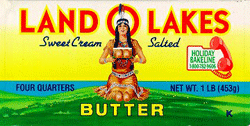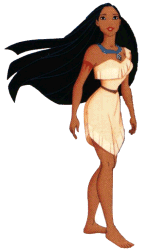Correspondent DMarks writes:
One of the things that popped into my head recently was a Mazola commercial with Indians chanting "Mazola, corn goodness. Mazola, corn goodness...." That was all I remembered.
I tried to find it on Youtube, but it is one of those commercials that hasn't survived, I guess.
I found some more information on this page:
Does anyone remember the crying indian
In a moderately interesting conversation of short comments about Native and other stereotypes, Shaggie says: "What about that old Mazola corn oil commercial from the 70s with all the Indians dancing around the fire chanting 'Mazola, Corn Goodness'? That was pretty pathetic. :("
He later says: "After seeing the Mazola corn oil commercial, I think a lot of Indians were crying about the airwaves being polluted with stereotypes."
This commercial would probably go well in Newspaper Rock as an example of a stereotype usage, if only a video copy or something more definite than this could be found.Comment: This commercial doesn't ring a bell with me. Perhaps I never saw it.
I looked it up and found that the Indian-Mazola connection is rather famous. In fact, the Mazola Corn Oil ads may be second only to the "crying Indian" environmental ads among commercials featuring Indians.
Some evidence:
Native Sons (1998)Sherman Alexie, a Spokane-Coeur d'Alene Indian poet and novelist who has transformed some of his own short stories into Smoke Signals (Miramax), wants to ditch the old images of Native Americans as stoics, nobles, and People of the Mazola Corn Oil ("what we call maize").Native Americans in the Twentieth CenturyIn addition to spawning professional investigations, Pan-Indian activism also helped changed the popular Native American cultural image in the United States. Although some of the "noble savage" stereotypes survived, as in the Advertising Council's antipollution commercials of the late 1970s or the Mazola Corn Oil commercials of 1980, public promotion of "heathen" images became less frequent. Universities such as Stanford and Dartmouth abandoned the name "Indians" as titles for their sports teams. Stereotypical frontier stories in which European-American successes were always "victories" and Native American successes always "massacres" appeared less frequently in the media.Towards a Transcultural FutureIn Princess Pocahontas, misrepresentations of "Indianness" are deconstructed through comic excess. ... The female noble savage is represented by Pocahontas, an archetype of the 'good Indian', one who aids and abets the white man, and as Lady Rebecca, married to John Rolfe, she represents Christianized Indian and the myth of successful assimilation. But in this play Pocahontas has multiple identities--Matoaka (Pocahontas's name as a child), Lady Rebecca, the Storybook Princess, Princess Buttered-on-Both-Sides (one of the many faces of the trickster Coyote), who appears as a contestant in the Miss North American Indian beauty pageant, a symbol of the Native American woman as the beneficent and fertile "Mother of us all."
The play opens with a beauty pageant host (played by a woman) introducing himself as "George Pepe Flaco Columbus Cartier de Gama Smith" and introducing "from her home in the deep green forest on the other side of the mountain, by the shores of the silver sea" Princess Buttered-on-Both-Sides. Coyote, like all tricksters, is a shape-shifter, and here coyote is in drag. The name "Princess Buttered-on-Both-Sides" is a mocking reference to the stereotypical representation of Indian women as "Princesses" in the world of advertising. Indian Princess types have been used to advertise both Mazola Corn Oil Margarine ("You call it corn, we call it maize," she declares) and "Land O' Lakes Butter." Princess Buttered-on-Both-Sides is thus doubly buttered, and ready, willing and able to service white men sexually and white society passively and servilely. She is a sexual fantasy and a dream of perfect assimilation.Comment: This simple search led to some interesting postings. I particularly like the note about activism causing stereotypical images to disappear. I'm always amazed when people denounce activism against
mascots and other stereotypes--as if a
lack of activism will somehow cause the desired changes. Get a clue, people: the squeaky wheel gets the grease.
For more on the subject, see the
Stereotype of the Month contest.







2 comments:
In the late 70s, I met two Native men (in the middle of the night at a 7-11 somewhere between Sedona and Phoenix when I was stranded without a vehicle (cause mercifully irrelevant here). They were in the area filming, yep, that Mazola commercial, and laughed heartily about it, singing the theme, a sort of chant: "Mazo-oh-la..." [ can't remember the rest of the lyrics, unfortunately). The only Mazola Indian commercial I can find online is the "We call it maize" version with the woman, but you are NOT delusional on this: the commercial with the men DID exist, and I even saw it on TV not too long after our midnight adventure.
Very nice guys, they smoked us out, gave us a 100-mile ride into Phoenix, wouldn't even take any gas money, and even had kind words for the cassette of my band's freshly mastered tracks for our as-yet unreleased debut album. Quite a night. Sure wish I could see that commercial again, but your mention of it is the only thing I've found... some memories are best left amorphous, I guess...
http://www.retrojunk.com/commercial/show/14903/another-mazola-margarine-ad
Post a Comment